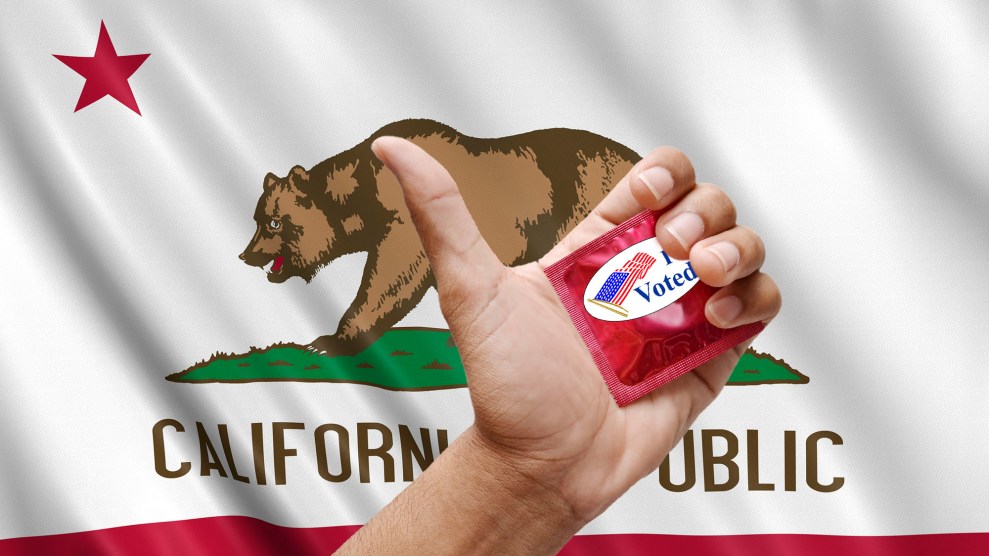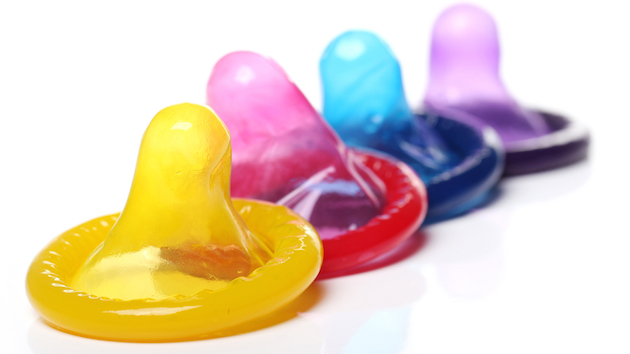
Visual7/iStock; Jfanchin/iStock
Among California’s long list of ballot initiatives up for grabs in November is Proposition 60, an initiative that would allow the state’s pornography viewers to sue adult-film producers—and, potentially, performers—if they can’t spot a condom in their latest download. And as it turns out, there’s at least one thing that California’s Democrats and Republicans can agree upon this election season: bareback porn.
Prop. 60 aims to fight the spread of sexually transmitted infections by adding the Safer Sex in the Adult Film Industry Act to state law. While California has required porn stars to wear condoms since 1992, the proposition ramps up enforcement by permitting state residents to file a complaint about performers not wearing condoms with the California Occupational Safety and Health Administration. Cal-OSHA would then have three weeks to respond before those residents could sue anyone with a financial interest in the production and, if the court rules against the pornographers, collect a quarter of the penalties. The proposition also requires producers to obtain state health licenses, register shoots with the state, and pay for performers’ STI testing.
The list of Prop. 60 opponents is formidable. Democrats don’t like it because of the potential for lawsuits that could compromise worker privacy. Republicans don’t like the cost: about $1 million in state expenses to license and regulate film production, and an additional several million dollars in lost taxes if the industry flees California, according to a state analysis. AIDS Project Los Angeles slammed the measure for its condoms-only approach, which “completely ignores recent developments in HIV biomedical prevention,” such as pre-exposure prophylaxis (PrEP)—a position taken by multiple AIDS groups. Newspaper editorial boards think it’s poorly written. And the porn industry has spoken out loudly against Prop. 60, claiming that its lawsuits would leave workers vulnerable to harassment from overzealous fans, anti-porn crusaders, and stalkers, to whom actors are especially vulnerable.
On the other side is the AIDS Healthcare Foundation, the world’s largest AIDS NGO, a 630,000-patient, 36-country behemoth with a $1.3 billion budget. Over the past decade, AHF’s president, Michael Weinstein, has become a gadfly to adult-film insiders due to his repeated attempts to impose safe-sex regulations on the industry. Now, after drafting a condoms-in-porn state bill that died in committee and failing to convince a Cal-OSHA supervisory board to adopt regulations over the objections of workers, AHF is appealing to the popular vote.
It’s a strategy that’s worked well in the past for Weinstein, who sees a larger public health significance to the condom question. “Many young people get their sex education from performers,” Weinstein said in an August interview with Mother Jones. “They get the message that the only kind of sex is unsafe.”
Weinstein said his interest in promoting condoms in porn started after an HIV outbreak struck the adult film industry in 2004. AHF began taking note of performers who came into its California clinics with HIV and other infections. Documented cases of HIV transmission on California adult-film sets have been virtually nonexistent since the 2004 outbreak, but gonorrhea and chlamydia are common among actors. And unlike PrEP, condoms can reduce their likelihood of transmission.
AHF has filed multiple OSHA complaints that have led to fines for some of the most powerful porn producers. Still, by 2012, Weinstein was frustrated by a lack of enforcement. “For too long, elected officials have dodged this workplace safety issue, punting the issue from city to county to state,” he said in a statement. That year, Weinstein took the issue first to the Los Angeles City Council and then to the voters of Los Angeles County, home to the San Fernando Valley, the hub of mainstream US porn production. AHF’s county initiative, known as Measure B, passed, requiring pornographers to obtain health permits from the county before shooting and post signs notifying performers that they were required to use condoms.
Still, most of the industry refused to adopt condoms. Over the next year, filming permits for adult-film shoots plummeted 95 percent in Los Angeles County, and producers sought only 11 of the newly required health permits the whole year. According to a lawyer for the porn company Vivid Entertainment, which sued to block Measure B on First Amendment grounds, producers were leaving the county “in droves,” moving to Las Vegas or other parts of California.
Now, four years after Measure B, AHF is presenting a similar—and stricter—proposal to the rest of the state. So far, the foundation has shelled out about $4.4 million to promote Prop. 60. (For comparison, opponents have raised around $433,000.) This isn’t AHF’s only fight on the ballot—the group is also staring down the pharmaceutical industry with a proposition to tie Medi-Cal drug spending to Veterans Administration prices—but it’s a lonely one, with no other group contributing a cent to the “Yes on Prop 60” PAC.
Lonely, except for support among 55 percent of registered California voters, according to a University of Southern California Dornsife/Los Angeles Times poll last month.
“I’m just worried that voters are blindly going to say, ‘Oh, condoms are good, so let’s save the poor porn stars who are being abused and are full of STIs,'” says Jiz Lee, a genderqueer, condoms-only performer and producer and a staunch opponent to Proposition 60. Lee, who also works behind the scenes for queer porn outfit Pink and White Productions, is especially worried about the extra spending Prop. 60 would mean for small operators. The expenses would be less of a problem for the big studios, Lee says, than for the growing number of producers and performers who are dealing with the proliferation of free porn online by producing their own clips, “camming,” and distributing exclusive content to paying viewers. Nowadays, most performers are producers, according to the Adult Performer Advocacy Committee—a group that claims to represent about 500 performers.
“I don’t know a single active performer who is for this,” Lee says. And while Lee adds that some performers are genuinely concerned about harassment and stalking, the main issue for others is comfort—and chafing. Once, while shooting a scene, Lee’s male co-star got an abrasion and began to bleed. That’s what comes from having porn-duration sex with a condom—and according to Lee, it gets worse when actors shoot several scenes a week. “There’s a lot of things that the proponents didn’t consider in terms of what it’s really like to do the work right now,” Lee said. “If you’re an individual performer, you have to have a lot of video.”
Meanwhile, the porn industry’s campaign against Prop. 60 has focused on the issue of worker harassment. Ela Darling, president of the APAC and founder of virtual-reality porn company Cam4VR, says violent harassment is common. “I get people who threaten to rape me, people who threaten to kill me. I’ve had someone threaten to slit my throat. People threaten to kill my dog,” she says. But the most intrusive harassment began after the legal names of porn performers leaked in 2011, she says. One harasser was able to find her family. “He figured out my mother’s work phone number, and he would call my mother and harass her, saying I’m a lesbian whore and that I’m bringing shame to the family. This is something people have done just with access to my legal name.”
As for Weinstein, Prop. 60 may be his final play to get more porn actors to wear condoms. “When this passes, from my point of view, this will complete the vast majority of our work on this subject,” he said. Will AHF use the proposition to file suits against porn companies, if it passes? “I don’t anticipate that,” Weinstein said. “I believe that either OSHA or the performers would take care of the issue.”
This article has been updated.








